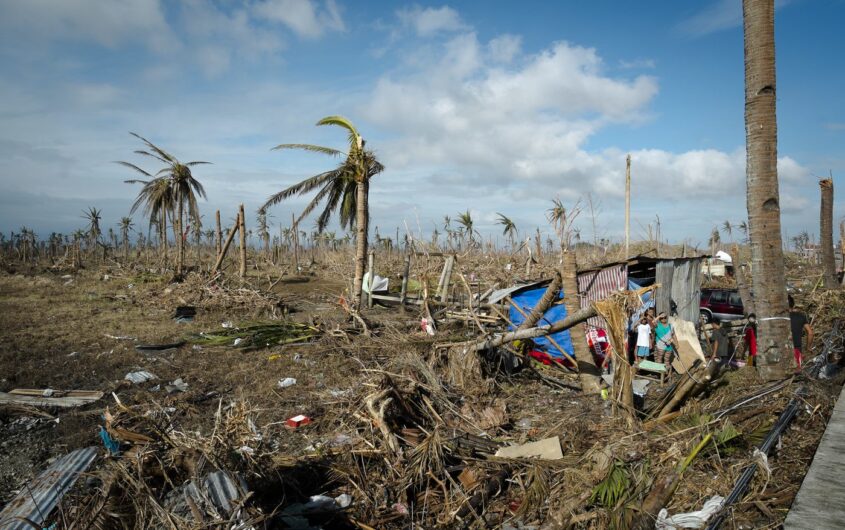
UNHCR/ R. Rocamora via Flickr
Loss and Damage: Why the Transatlantic Partnership Must Lead

Thomas Protzman
Thomas Protzman is a Halle Foundation research intern at AGI in fall 2024. He is pursuing a master's degree in International Affairs with a concentration in Human Rights and Global Governance at the Hertie School in Berlin and is currently on academic exchange at the Elliott School of International Affairs at George Washington University. He spent three years in Vienna, completing a teaching fellowship with Fulbright Austria. He earned his undergraduate degree in History from Denison University and studied for a semester at the Ruprecht-Karls Universität in Heidelberg, Germany. Additionally, he brings experience from his time as an intern for U.S. Senator Sherrod Brown. Thomas is committed to strengthening institutional ties and fostering collaborative leadership in the transatlantic sphere. He has a wide range of research interests, including climate change, populism, and institutional trust.
The world’s most vulnerable nations are bearing the brunt of climate change’s destructive power. From unprecedented flooding in South Asia to devastating hurricanes in the Caribbean, the cost of inaction is no longer theoretical; it is real, and it is escalating. As climate-related disasters intensify, these regions are calling for reparations, and the question is no longer whether wealthy states should pay for the damage they have caused but when. With no universally accepted framework holding states accountable for climate-related damages, the establishment of norms surrounding state responsibility will be an essential tool in addressing the global challenge of climate change. As a “threat multiplier,” climate change exacerbates other issues like intra- and inter-state conflict, resource scarcity, and land degradation. By proactively building and promoting climate responsibility norms, the transatlantic partnership can reduce the strain on future diplomatic, economic, and military resources. Ahead of the International Court of Justice’s (ICJ) Advisory Opinion on the Obligations of States in respect of Climate Change, ordered by United Nations General Assembly Resolution 77/276 (UNGA Res. 77/276), this stance would position the transatlantic partnership as a global leader in climate action and reinforce its role as a stabilizing force on the international stage.
A brief history of loss and damage
Loss and damage refers to the irreversible economic, social, and environmental harm caused by climate change, often disproportionately impacting developing nations that have contributed the least to global emissions but face the most severe consequences. In 1998, Martha Finnemore and Kathryn Sikkink introduced[1] the concept of the “norm life cycle,” a three-stage process by which ideas evolve into norms within international relations. A norm, in this context, begins as an idea championed by a “norm entrepreneur.” With the support of key “critical states,” the idea gains traction, ultimately reaching a tipping point, a “cascade” in which a critical mass of states endorses it, solidifying its status as an accepted and internalized international norm.
The norm entrepreneurs for loss and damage are the small island states who have been calling for loss and damage compensation for decades.[2] As early as 1991, during the establishment of the United Nations Framework Convention on Climate Change (UNFCCC), Vanuatu, representing the Alliance of Small Island States (AOSIS), suggested the creation of an insurance scheme to provide financial support to nations affected by sea level rise, although the proposal gained little traction at the time. In 2002, Koloa Talake, then prime minister of Tuvalu, announced that Tuvalu and two other island nations, Kiribati and Maldives, planned to take legal action[3] against major polluting countries that refused to join the Kyoto Protocol. In September 2011, the Republic of Palau’s President Johnson Toribiong told the United Nations General Assembly that climate change implicates the international rule of law and warranted consideration by the ICJ, calling for an ICJ advisory opinion on the obligations and responsibilities of states under international law to avoid transboundary harm caused by greenhouse gas emissions. That came in early 2023, when the UN General Assembly officially requested an Advisory Opinion[4] from the ICJ on the obligations of states pertaining to climate change. At COP28, parties reached an agreement on the operationalization of the Loss and Damage Fund and funding arrangement, and commitments to the fund started coming in moments after the decision was gaveled, totaling more than 700 million USD to date. Germany, France, and Italy have each committed over 100 million USD to the Loss and Damage Fund. The United States must match these efforts and set the standard for climate responsibility on the world stage. In addition to financial contributions, the United States and Europe should push for the integration of loss and damage into global climate governance frameworks by championing other diplomatic, technical, and legal initiatives that normalize the idea of state responsibility for climate-related damages.
The costs of inaction
It is in the interest of the United States and its European partners to commit heavily to the Loss and Damage Fund and position themselves as “critical states” in advancing these norms for two reasons. The first is to alleviate future burdens. By fostering international norms around climate responsibility now, transatlantic partners can mitigate the future impacts of mass migration, making it more manageable and reducing potential crises. Recent migration crises, such as the Syrian refugee crisis and migration from sub-Saharan Africa to Europe, illustrate the high costs—both financial and political—of not addressing root causes. In both cases, slow international responses to droughts and subsequent agricultural collapses exacerbated the crises, increasing strain on European resources and destabilizing regional politics. Similarly, the United States has faced significant challenges from migration linked to instability in Central America. While violence and corruption are immediate drivers of migration from the Northern Triangle, climate change is slowly but surely pushing families to leave their homes. The Inter-American Dialogue estimates that “in the next 30 years, 3.9 million climate refugees will flee Central America.” Per the Congressional Research Service, “the COVID-19 pandemic and Hurricanes Eta and Iota… contributed to gross domestic product (GDP) contractions of 9.0 percent in Honduras, 7.9 percent in El Salvador, and 1.8 percent in Guatemala in 2020.” Addressing climate change as a root cause of migration is not just a moral imperative but a geopolitical necessity. By financing efforts now, the transatlantic partnership can reduce future economic and humanitarian strains rather than face costly reactive measures down the line.
The United States and Europe should push for the integration of loss and damage into global climate governance frameworks by championing other diplomatic, technical, and legal initiatives that normalize the idea of state responsibility for climate-related damages.
The second reason to promote loss and damage norms is to strengthen cooperation with the developing world. Taking a leadership role in championing climate norms would bolster relationships with those countries most vulnerable to climate change—creating strategic alliances that are crucial in the West’s competition with China for global influence. AOSIS specifically acknowledged China as a proponent of the Loss and Damage Fund, after China, along with the Group of 77, called for states “to ensure enhanced action on addressing loss and damage associated with the adverse effects of climate change through the provision of new, predictable, and reliable financial support for the assessment of, and responses to, loss and damage through an appropriate financial mechanism.” As an emerging global power, China recognizes an opportunity to position itself as a leading advocate among developed nations for a rapidly growing norm that benefits numerous developing countries, thereby enhancing its reputation and expanding its influence among those states. This enables China to negotiate more easily with them on various political and economic issues as it aggressively pursues its goals in the developing world. Between 2005 and 2022, Chinese investment in Latin America totaled 148.9 billion USD. As it deepens its engagement with the region, it has leveraged economic diplomacy, securing access to critical resources and investing in infrastructure in exchange for Latin American countries ending formal diplomatic ties with and recognition of Taiwan. Since 2017, five Latin American countries have agreed. As China continues to deepen its influence in Central America, the region is becoming a strategic battleground. The transatlantic partnership cannot afford to lose ground to a global competitor that is unburdened by the consequences of regional migration.
A defining moment in global climate justice accountability
The operationalization of the Loss and Damage Fund at COP28 represents a critical step toward establishing loss and damage as a norm. By fostering these norms, the transatlantic partnership can help mitigate and prevent future burdens such as mass migration, reducing the potential for economic, political, and humanitarian crises caused by climate change down the road. The transatlantic partners must now commit fully to being the leading financial contributors to this Fund, ensuring that vulnerable nations receive the financial resources they need to recover from climate disasters. In addition to financial contributions, the United States and Europe can promote these norms through diplomatic channels, pushing for the integration of loss and damage into global climate governance frameworks, and providing technical assistance to vulnerable nations to build climate resilience. China has already recognized the strategic value of advocating for loss and damage norms, leveraging its influence among developing nations to expand its reach. If the transatlantic partnership fails to act decisively, it risks ceding critical diplomatic ground to a global competitor that is not bound by the same values of human rights and democratic governance. To reaffirm its global leadership on justice, stability, and a sustainable future, the transatlantic partnership must shape the future of international norms governing state responsibility for climate-related harm.
[1] Martha Finnemore and Kathryn Sikkink, “International Norm Dynamics and Political Change,” International Organization 52, no. 4 (1998): 887–917. https://www.jstor.org/stable/2601361.
[2] A.S. Rao, “The Overdue Climate Justice of Loss and Damage,” Journal of International Affairs 75, no. 1 (2022): 389–402. https://www.jstor.org/stable/27203142.
[3] Y. Takamura, “Climate Change and Small Island Claims in the Pacific,” in Climate Change: International Law and Global Governance: Volume I: Legal Responses and Global Responsibility, ed. Oliver C. Ruppel, Christian Roschmann, and Katharina Ruppel-Schlichting (Baden-Baden: Nomos Verlagsgesellschaft mbH, 2013), 657–684, https://www.jstor.org/stable/j.ctv941w8s.25.
[4] Resolution 77/276: Request for an Advisory Opinion of the International Court of Justice on the Obligations of States in Respect of Climate Change, UNGA, 2023. https://drive.google.com/file/d/1p6U3S-u5cfTDNzJ0E-vJ0GpnjCocuj55/view.








